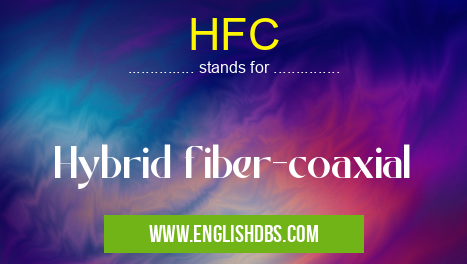What does HFC mean in TECHNOLOGY
Hybrid fiber-coaxial (HFC) is a telecommunications technology that combines optical fiber and coaxial cable to provide high-speed data and video transmission over a single network infrastructure. It is commonly used by cable television providers to deliver cable TV, internet, and telephone services to residential and commercial customers.

HFC meaning in Technology in Computing
HFC mostly used in an acronym Technology in Category Computing that means Hybrid fiber-coaxial
Shorthand: HFC,
Full Form: Hybrid fiber-coaxial
For more information of "Hybrid fiber-coaxial", see the section below.
» Computing » Technology
How HFC Works
HFC networks utilize both fiber optic cables and coaxial cables. Fiber optic cables are used for the high-speed transmission of data from the headend to the neighborhood node. Coaxial cables are then used to distribute the data to individual homes and businesses. This combination of technologies allows for a cost-effective and efficient way to deliver high-bandwidth services to customers.
Advantages of HFC
HFC offers several advantages over traditional copper-only networks:
- Faster speeds: Fiber optic cables enable much higher data transmission rates than copper cables, allowing for faster internet speeds and high-quality video streaming.
- Greater capacity: Fiber optic cables can carry significantly more data than copper cables, providing more bandwidth for multiple users and services.
- Increased reliability: Fiber optic cables are less susceptible to interference and damage than copper cables, resulting in a more reliable and stable network connection.
Essential Questions and Answers on Hybrid fiber-coaxial in "COMPUTING»TECHNOLOGY"
What is Hybrid Fiber-Coaxial (HFC)?
HFC is a broadband technology that combines fiber-optic cables with coaxial cables to deliver high-speed internet, video, and voice services. It utilizes the existing coaxial cable infrastructure to extend the reach of fiber-optic networks, providing faster speeds and improved reliability.
How does HFC work?
HFC networks use fiber-optic cables to transmit data from a central office to a distribution point near customer homes. From there, coaxial cables are used to deliver the signals directly to individual homes and businesses. This hybrid approach allows for high-speed data transmission over longer distances than fiber-optic cables alone.
What are the benefits of HFC over traditional cable?
HFC offers several advantages over traditional cable:
- Faster speeds: HFC networks can deliver gigabit-per-second (Gbps) internet speeds, significantly faster than traditional cable's maximum speeds of around 300 Mbps.
- Increased bandwidth: HFC provides a wider bandwidth than traditional cable, allowing for multiple devices to connect and stream simultaneously without experiencing slowdowns.
- Improved reliability: Fiber-optic cables are less susceptible to interference and damage than coaxial cables, resulting in more stable and reliable connections.
- Future-proof: HFC networks are designed to support future upgrades, ensuring they can keep up with increasing bandwidth demands.
What are the limitations of HFC?
HFC may have some limitations compared to pure fiber-optic networks:
- Distance: HFC networks are limited by the distance that coaxial cables can reliably transmit signals.
- Topology: HFC networks are typically arranged in a tree-like topology, which can create bottlenecks if there is high traffic on the network.
- Latency: HFC networks may have slightly higher latency than pure fiber-optic connections, but this is generally not noticeable for most applications.
Final Words: Hybrid fiber-coaxial technology plays a vital role in delivering high-speed data, video, and telephone services to residential and commercial customers. By combining the advantages of both fiber optic and coaxial cables, HFC networks provide reliable, fast, and cost-effective connectivity for a wide range of applications. As the demand for high-bandwidth services continues to grow, HFC is expected to remain a key technology in the telecommunications industry for the foreseeable future.
HFC also stands for: |
|
| All stands for HFC |
